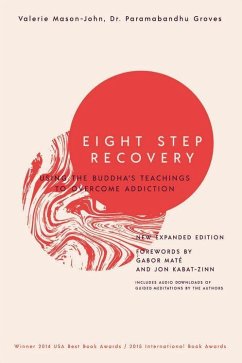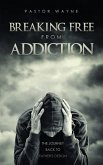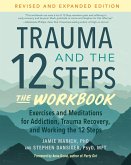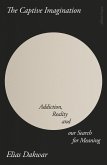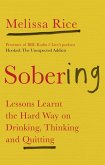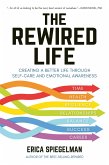Valerie Mason-John, Paramabandhu Groves
Eight Step Recovery
Using the Buddha's Teachings to Overcome Addiction
17,99 €
inkl. MwSt.
Versandfertig in über 4 Wochen

9 °P sammeln
Valerie Mason-John, Paramabandhu Groves
Eight Step Recovery
Using the Buddha's Teachings to Overcome Addiction
- Broschiertes Buch
- Merkliste
- Auf die Merkliste
- Bewerten Bewerten
- Teilen
- Produkt teilen
- Produkterinnerung
- Produkterinnerung
New material includes Foreword by Jon Kabat-Zinn, how to run Eight Step Recovery Meetings, and how to mentor. Whether you are struggling to stay off heroin or with an obsessive pattern of thinking that prevents you from leading a more fulfilling life, the same principles - the Eight Steps of this book - apply.
Andere Kunden interessierten sich auch für
![This Day in Recovery: 365 Meditations This Day in Recovery: 365 Meditations]() This Day in Recovery: 365 Meditations15,99 €
This Day in Recovery: 365 Meditations15,99 €![Breaking Free from Addiction: The Journey Back to Father's Design Breaking Free from Addiction: The Journey Back to Father's Design]() Pastor WayneBreaking Free from Addiction: The Journey Back to Father's Design15,99 €
Pastor WayneBreaking Free from Addiction: The Journey Back to Father's Design15,99 €![Trauma and the 12 Steps--The Workbook Trauma and the 12 Steps--The Workbook]() Jamie MarichTrauma and the 12 Steps--The Workbook24,99 €
Jamie MarichTrauma and the 12 Steps--The Workbook24,99 €![The Captive Imagination The Captive Imagination]() Elias DakwarThe Captive Imagination25,99 €
Elias DakwarThe Captive Imagination25,99 €![Sobering: Lessons Learnt the Hard Way on Drinking, Thinking and Quitting Sobering: Lessons Learnt the Hard Way on Drinking, Thinking and Quitting]() Melissa RiceSobering: Lessons Learnt the Hard Way on Drinking, Thinking and Quitting20,99 €
Melissa RiceSobering: Lessons Learnt the Hard Way on Drinking, Thinking and Quitting20,99 €![The Fix The Fix]() Ian Morgan CronThe Fix15,99 €
Ian Morgan CronThe Fix15,99 €![The Rewired Life: Creating a Better Life Through Self-Care and Emotional Awareness The Rewired Life: Creating a Better Life Through Self-Care and Emotional Awareness]() Erica SpiegelmanThe Rewired Life: Creating a Better Life Through Self-Care and Emotional Awareness23,99 €
Erica SpiegelmanThe Rewired Life: Creating a Better Life Through Self-Care and Emotional Awareness23,99 €-
-
-
New material includes Foreword by Jon Kabat-Zinn, how to run Eight Step Recovery Meetings, and how to mentor. Whether you are struggling to stay off heroin or with an obsessive pattern of thinking that prevents you from leading a more fulfilling life, the same principles - the Eight Steps of this book - apply.
Produktdetails
- Produktdetails
- Verlag: Windhorse Publications
- New ed
- Seitenzahl: 280
- Erscheinungstermin: 18. September 2018
- Englisch
- Abmessung: 231mm x 156mm x 27mm
- Gewicht: 548g
- ISBN-13: 9781911407126
- ISBN-10: 1911407120
- Artikelnr.: 47745085
- Herstellerkennzeichnung
- Libri GmbH
- Europaallee 1
- 36244 Bad Hersfeld
- gpsr@libri.de
- Verlag: Windhorse Publications
- New ed
- Seitenzahl: 280
- Erscheinungstermin: 18. September 2018
- Englisch
- Abmessung: 231mm x 156mm x 27mm
- Gewicht: 548g
- ISBN-13: 9781911407126
- ISBN-10: 1911407120
- Artikelnr.: 47745085
- Herstellerkennzeichnung
- Libri GmbH
- Europaallee 1
- 36244 Bad Hersfeld
- gpsr@libri.de
Dr Valerie Mason-John (Vimalasara) is a playwright and the author of seven books, including Detox Your Heart (2005, Windhorse Publications), and her award winning novel Borrowed Body, republished as the Banana Kid. Her most recent publication, The Great Black North - Contemporary African Canadian poetry 2013, is the first national anthology to document the voices of African Canadian Poets. She has just completed her second novel, The War Done Done. She works as a consultant in Conflict Transformation, Restorative Justice, Leadership and anti Bullying in both the domestic field of education, social services, youth, addiction and the police, as well as in the corporate world. She was ordained into the Triratna Buddhist Order in 2005. She is currently based at the Vancouver Buddhist centre. Dr Paramabandhu Groves is a consultant psychiatrist working in the National Health Service in the UK, and has specialized in the field of addiction for 20 years. He is the clinical director of Breathing Space, which is the health and well-being wing of the London Buddhist Centre, teaching mindfulness-based approaches to help with depression, addiction, and stress. He developed the Mindfulness-Based Relapse Prevention course for addiction, which has successfully run in both the UK and Canada. He is the author of Practical Buddhism: Mindfulness and Skillful Living in the Modern Era, and has published academic papers and contributed to several books in the field of addiction. He is ordained into the Triratna Buddhist Order.
CONTENTS
Dedication
Foreword by Jon Kabat-Zinn
Foreword by Gabor Mate
About the authors
Acknowledgements
Introduction
Our personal stories
Who was the Buddha?
The Buddha was in recovery
The Buddha's teaching
Eight Steps toward recovery
Who is this book for?
How to use this book
Eight Step Recovery meetings
Mindfulness Based Addiction Recovery (MBAR) program
Step One: Accepting that this human life will bring suffering
Three types of suffering
Everyone has pain
The Four Reminders
How we practice this step
Three-minute breathing space, AGE
Step Two: Seeing how we create extra suffering in our lives
The common ways we deal with suffering
Craving as the source of suffering
Types of suffering
The Hungry Ghosts
How we practice this step
Three-minute breathing space, AGE
Step Three: Embracing impermanence show us that our suffering can end
Impermanence
We can change
Impermanence and addiction
How we practice this step
Three-minute breathing space, AGE
Step Four: Being willing to step onto the path of recovery - and discover
freedom
Vision and transformation
Kindness to help us stay on the path of recovery
How we practice this step
Three-minute breathing space, AGE
Step Five: Transforming our speech, actions and livelihood
The importance of thoughts and emotions
Transforming speech
Transforming actions
Transforming livelihood
How we practice this step
Three-minute breathing space, AGE
Step Six: Placing positive values at the center of our lives
Exploring values
How we practice this step
Three-minute breathing space, AGE
Step Seven: Making every effort to stay on the path of recovery
Staying on the path of recovery
How we practice this step
Three-minute breathing space, AGE
Step Eight: Helping others to share the benefits I have gained
The Fourth Sight
Helping ourselves and others
How we practice this step
Three-minute breathing space, AGE
Dedication
Foreword by Jon Kabat-Zinn
Foreword by Gabor Mate
About the authors
Acknowledgements
Introduction
Our personal stories
Who was the Buddha?
The Buddha was in recovery
The Buddha's teaching
Eight Steps toward recovery
Who is this book for?
How to use this book
Eight Step Recovery meetings
Mindfulness Based Addiction Recovery (MBAR) program
Step One: Accepting that this human life will bring suffering
Three types of suffering
Everyone has pain
The Four Reminders
How we practice this step
Three-minute breathing space, AGE
Step Two: Seeing how we create extra suffering in our lives
The common ways we deal with suffering
Craving as the source of suffering
Types of suffering
The Hungry Ghosts
How we practice this step
Three-minute breathing space, AGE
Step Three: Embracing impermanence show us that our suffering can end
Impermanence
We can change
Impermanence and addiction
How we practice this step
Three-minute breathing space, AGE
Step Four: Being willing to step onto the path of recovery - and discover
freedom
Vision and transformation
Kindness to help us stay on the path of recovery
How we practice this step
Three-minute breathing space, AGE
Step Five: Transforming our speech, actions and livelihood
The importance of thoughts and emotions
Transforming speech
Transforming actions
Transforming livelihood
How we practice this step
Three-minute breathing space, AGE
Step Six: Placing positive values at the center of our lives
Exploring values
How we practice this step
Three-minute breathing space, AGE
Step Seven: Making every effort to stay on the path of recovery
Staying on the path of recovery
How we practice this step
Three-minute breathing space, AGE
Step Eight: Helping others to share the benefits I have gained
The Fourth Sight
Helping ourselves and others
How we practice this step
Three-minute breathing space, AGE
CONTENTS
Dedication
Foreword by Jon Kabat-Zinn
Foreword by Gabor Mate
About the authors
Acknowledgements
Introduction
Our personal stories
Who was the Buddha?
The Buddha was in recovery
The Buddha's teaching
Eight Steps toward recovery
Who is this book for?
How to use this book
Eight Step Recovery meetings
Mindfulness Based Addiction Recovery (MBAR) program
Step One: Accepting that this human life will bring suffering
Three types of suffering
Everyone has pain
The Four Reminders
How we practice this step
Three-minute breathing space, AGE
Step Two: Seeing how we create extra suffering in our lives
The common ways we deal with suffering
Craving as the source of suffering
Types of suffering
The Hungry Ghosts
How we practice this step
Three-minute breathing space, AGE
Step Three: Embracing impermanence show us that our suffering can end
Impermanence
We can change
Impermanence and addiction
How we practice this step
Three-minute breathing space, AGE
Step Four: Being willing to step onto the path of recovery - and discover
freedom
Vision and transformation
Kindness to help us stay on the path of recovery
How we practice this step
Three-minute breathing space, AGE
Step Five: Transforming our speech, actions and livelihood
The importance of thoughts and emotions
Transforming speech
Transforming actions
Transforming livelihood
How we practice this step
Three-minute breathing space, AGE
Step Six: Placing positive values at the center of our lives
Exploring values
How we practice this step
Three-minute breathing space, AGE
Step Seven: Making every effort to stay on the path of recovery
Staying on the path of recovery
How we practice this step
Three-minute breathing space, AGE
Step Eight: Helping others to share the benefits I have gained
The Fourth Sight
Helping ourselves and others
How we practice this step
Three-minute breathing space, AGE
Dedication
Foreword by Jon Kabat-Zinn
Foreword by Gabor Mate
About the authors
Acknowledgements
Introduction
Our personal stories
Who was the Buddha?
The Buddha was in recovery
The Buddha's teaching
Eight Steps toward recovery
Who is this book for?
How to use this book
Eight Step Recovery meetings
Mindfulness Based Addiction Recovery (MBAR) program
Step One: Accepting that this human life will bring suffering
Three types of suffering
Everyone has pain
The Four Reminders
How we practice this step
Three-minute breathing space, AGE
Step Two: Seeing how we create extra suffering in our lives
The common ways we deal with suffering
Craving as the source of suffering
Types of suffering
The Hungry Ghosts
How we practice this step
Three-minute breathing space, AGE
Step Three: Embracing impermanence show us that our suffering can end
Impermanence
We can change
Impermanence and addiction
How we practice this step
Three-minute breathing space, AGE
Step Four: Being willing to step onto the path of recovery - and discover
freedom
Vision and transformation
Kindness to help us stay on the path of recovery
How we practice this step
Three-minute breathing space, AGE
Step Five: Transforming our speech, actions and livelihood
The importance of thoughts and emotions
Transforming speech
Transforming actions
Transforming livelihood
How we practice this step
Three-minute breathing space, AGE
Step Six: Placing positive values at the center of our lives
Exploring values
How we practice this step
Three-minute breathing space, AGE
Step Seven: Making every effort to stay on the path of recovery
Staying on the path of recovery
How we practice this step
Three-minute breathing space, AGE
Step Eight: Helping others to share the benefits I have gained
The Fourth Sight
Helping ourselves and others
How we practice this step
Three-minute breathing space, AGE
